Matthew Cobb
University of Manchester
Based on a stage play of the same name by Cyril Gely, Diplomatie addresses what is often presented as one of the enigmas of the Second World War: why did the Germans not destroy Paris, when Hitler clearly ordered his troops to leave it as “a pile of rubble”? The answer provided by the film is that the German commander of Paris, General Dietrich von Choltitz, was persuaded not to destroy the city by the action of the Swedish Consul, Raoul Nordling, following a series of discussions during the night of 24-25 August 1944. ‘Une nuit pour sauver Paris de la destruction’ as the strap on the film poster puts it.
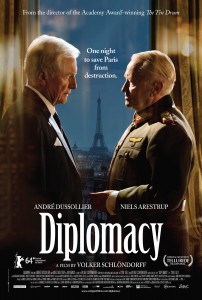 Beautifully acted by André Dussolier and Niels Arestrup, the film also deals with the broader issues of duty, honour and what motivates people to carry out terrible acts during wartime, and neatly skewers the hypocrisies of each side bemoaning civilian deaths while at the same time planning them in the most systematic way. As such it provides ample material for reflection on the course of WWII and indeed of any war, and invites the viewer to respond to von Choltitz’s pointed question to Nordling: “Que feriez-vous à ma place?” Nordling has no answer to this, beyond the not particularly helpful “Je ne serai pas à votre place.”
Beautifully acted by André Dussolier and Niels Arestrup, the film also deals with the broader issues of duty, honour and what motivates people to carry out terrible acts during wartime, and neatly skewers the hypocrisies of each side bemoaning civilian deaths while at the same time planning them in the most systematic way. As such it provides ample material for reflection on the course of WWII and indeed of any war, and invites the viewer to respond to von Choltitz’s pointed question to Nordling: “Que feriez-vous à ma place?” Nordling has no answer to this, beyond the not particularly helpful “Je ne serai pas à votre place.”
Any viewing of the film, however, needs to be accompanied by a health warning. This is a work of fiction. Virtually every part of it is made up, except that von Choltitz and Nordling were real people, the Germans did occupy Paris, and they were led by Adolf Hitler.
At one level, this extreme level of fictionalisation doesn’t matter. The acting is brilliant – Arestrup in particular portrays a huge range of emotions – and the central conundrum of what is and is not permissible in war extends beyond the events of Paris in August 1944. Clearly, fiction provides a powerful source for reflection, debate and the clash of ideas – we can be stimulated to think about broader political issues by episodes of Battlestar Galactica, see parallels to the history of medieval France in Game of Thrones, or debate the ethics of rewilding and cloning by watching Jurassic Park.
The problem comes, of course, when the fictional representation is taken for reality. The average viewer of Diplomatie would have no reason to doubt the starting point of the film: the Germans were about to destroy Paris. To persuade us to accept this set-up, the film opens with contemporary newsreel footage of the terrible destruction of Warsaw occurring 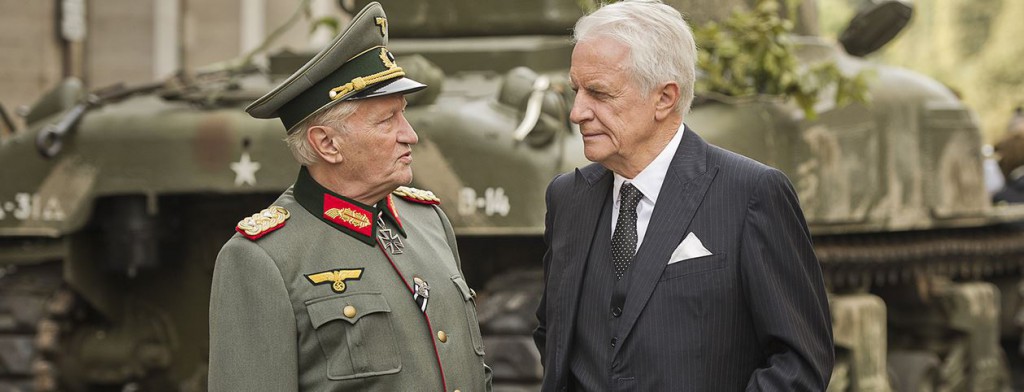 around the same time. There is no hint that the destruction of Warsaw took place partly because Stalin refused to send in the Red Army, preferring to see the Germans crush a Polish Resistance uprising that he did not want to see in power. Despite the arguments used at the time – primarily by the Free French in order to restrain the Resistance-led Parisian insurrection – Paris was never going to suffer the same fate as Warsaw.
around the same time. There is no hint that the destruction of Warsaw took place partly because Stalin refused to send in the Red Army, preferring to see the Germans crush a Polish Resistance uprising that he did not want to see in power. Despite the arguments used at the time – primarily by the Free French in order to restrain the Resistance-led Parisian insurrection – Paris was never going to suffer the same fate as Warsaw.
According to the film, von Choltitz had placed mines under all of the Paris bridges (except the Pont Neuf) of sufficient power to block the Seine and flood the city; four submarine torpedoes were strapped to each leg of the Eiffel Tower, and tons of explosives littered the basements of various Parisian buildings. Not only are we shown plans outlining the location of these explosives, we are also repeatedly taken into a bunker where a Lieutenant Hegger has a complex device which will set off all these bombs.
Every bit of this is invented, and even slightly absurd. The Paris bridges were not all mined and even if they had been destroyed, the Seine would not have flooded (earlier in 1944 the Germans destroyed all the bridges over the Arno in Florence, with the exception of the Ponte Vecchio; the city did not flood). The famous submarine torpedoes that were stocked in a tunnel in Saint-Cloud remained there, unarmed and unused. After the Liberation, a report showed that although there were stocks of explosives in various parts of Paris, only two locations had been mined: the telephone exchange on the rue des Archives and the pont Saint-Cloud. Neither device was deployed.
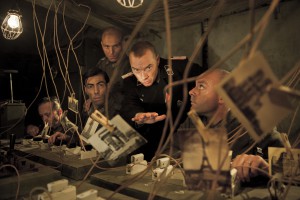 Equally problematic is the other half of the dramatic equation: Nordling was not an agent of the Resistance, and he did not meet with von Choltitz on the night of the 24-25 August. As the film suggests, they had met before to negotiate the release of Resistance fighters and other prisoners. Nordling played a significant role in trying to quell the insurrection by the Paris Resistance which began on 15 August with the occupation of the Préfecture de Police, during which time he was manipulated by various British spies such as MI5 operative Colonel Arnould and two German British agents, ‘Bobby’ Bender and Lieutenant Posch-Pastor. The Allies and the Free French did not want the Resistance, with its strong Communist component, to take power in Paris. Nordling, for his part, was eager to avoid bloodshed, believing the various untruths he was told by the British agents regarding an alleged German advance on the city.
Equally problematic is the other half of the dramatic equation: Nordling was not an agent of the Resistance, and he did not meet with von Choltitz on the night of the 24-25 August. As the film suggests, they had met before to negotiate the release of Resistance fighters and other prisoners. Nordling played a significant role in trying to quell the insurrection by the Paris Resistance which began on 15 August with the occupation of the Préfecture de Police, during which time he was manipulated by various British spies such as MI5 operative Colonel Arnould and two German British agents, ‘Bobby’ Bender and Lieutenant Posch-Pastor. The Allies and the Free French did not want the Resistance, with its strong Communist component, to take power in Paris. Nordling, for his part, was eager to avoid bloodshed, believing the various untruths he was told by the British agents regarding an alleged German advance on the city.
This partly explains why Nordling negotiated the notorious trève between the Resistance and the Germans, which temporarily decreased the fighting and would have allowed the Germans free passage out of the city had some determined sections of the Resistance not refused to accept the truce. On 20 August, following the arrest of Free French Resistance leader Alexandre Parodi, von Choltitz had even summoned Nordling to vouchsafe for Parodi, and as a result released the Frenchman and his two comrades. But Nordling and von Choltitz never met alone together, and they never explicitly discussed the potential destruction of Paris
Given that the plot of the film presumes the imminent destruction of Paris, it is surprisingly confused about the reason behind such an order. At various points German officers emphasise the strategic importance of Paris, claiming that if Paris falls, the whole of France would fall, whereas Nordling argues that Hitler’s reputation amongst the German people would be irreparably damaged if Paris fell. At other moments the strategic irrelevance of Paris is correctly underlined. So what’s the real story?
After the Allied landings in Provence on 15 August, and the closing of the Falaise Pocket in Normandy, the German occupation of France was doomed. Hitler immediately made plans to withdraw to the east of the country, and Paris was merely another city on the map. Despite its symbolism for the French, the Allies were in no hurry to liberate it, while Hitler’s instruction that the city should be abandoned only as a pile of rubble was mere rhetoric that was equally applicable to all German positions, intended to stiffen the resolve of his troops and to delay the Allies.
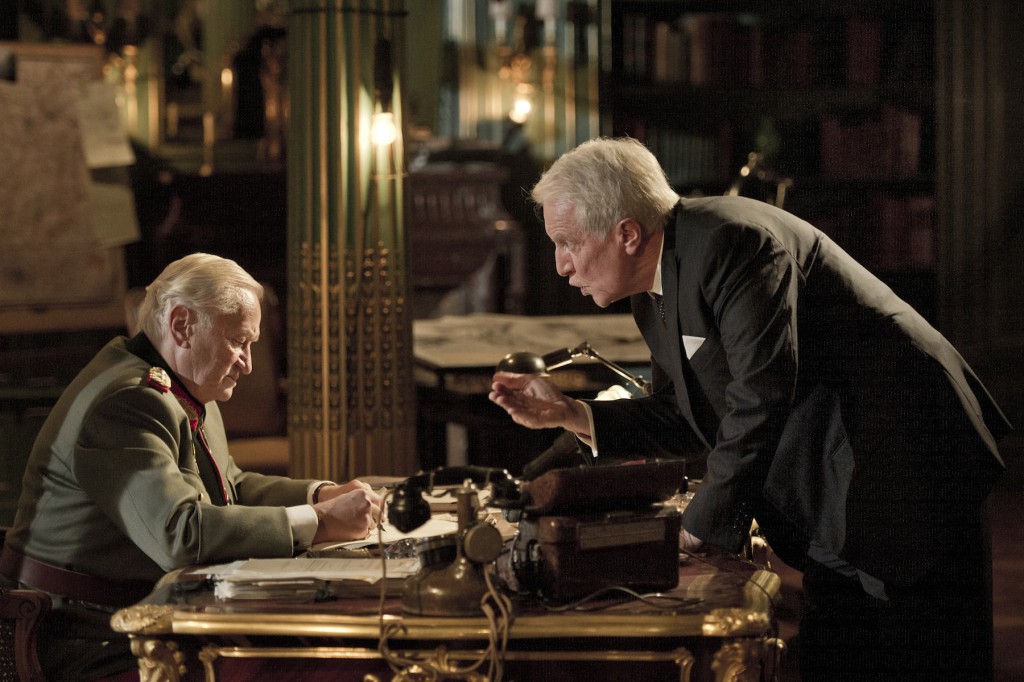 Von Choltitz was never given the men or materiel to carry out this threat. He never faced the terrible dilemma portrayed in Diplomatie, nor – as far as we know – was he motivated to obey by fears for his family, even though this is the central explanation offered in the film. Von Choltitz is presented as a complex character, having lost his faith in Hitler (this is true) and worried about his family. When Nordling explains how he might save his family (spoiler: the Swedish consul is lying), the German commander seizes on the opportunity, and gives the order to stand down. A few more twists later, his orders are obeyed and the city is saved. All very dramatic, but all utterly untrue.
Von Choltitz was never given the men or materiel to carry out this threat. He never faced the terrible dilemma portrayed in Diplomatie, nor – as far as we know – was he motivated to obey by fears for his family, even though this is the central explanation offered in the film. Von Choltitz is presented as a complex character, having lost his faith in Hitler (this is true) and worried about his family. When Nordling explains how he might save his family (spoiler: the Swedish consul is lying), the German commander seizes on the opportunity, and gives the order to stand down. A few more twists later, his orders are obeyed and the city is saved. All very dramatic, but all utterly untrue.
Von Choltitz did not destroy the city because he did not have the means to do so. For the same reason, he did not obey Hitler’s order to fight to the end; like many other German officers he concluded that it was a pointless waste of life. He might have staged a Wagnerian end in the flames and smoke of the Hotel Meurice but chose not to. What would he have done had the astonishing weaponry described in Diplomatie actually been available? I cannot say, and nothing in Diplomatie sheds light on that conundrum.
I could bore you with a long list of things that made me grind my teeth – four Panzer Divisions were not sent to relieve Paris and so were not ‘bloquées à Soissons’; there was no secret staircase into von Choltitz’s apartment in the Hotel Meurice; it was Nordling, not von Choltitz, who suffered from angina and was repeatedly ill at this time; German officers arriving from Berlin would not have boasted about driving through ‘enemy lines’, because the Allies were still to the West of Paris; there was no letter from General Leclerc to the German commander; there was no French engineer called Lanvin who helped the Germans lay their fictitious charges. Although they are irritating to the historian, all these fictional intrusions were in some part necessary to make the story more dramatic and to drive it forward, and in that sense they are partly forgivable.
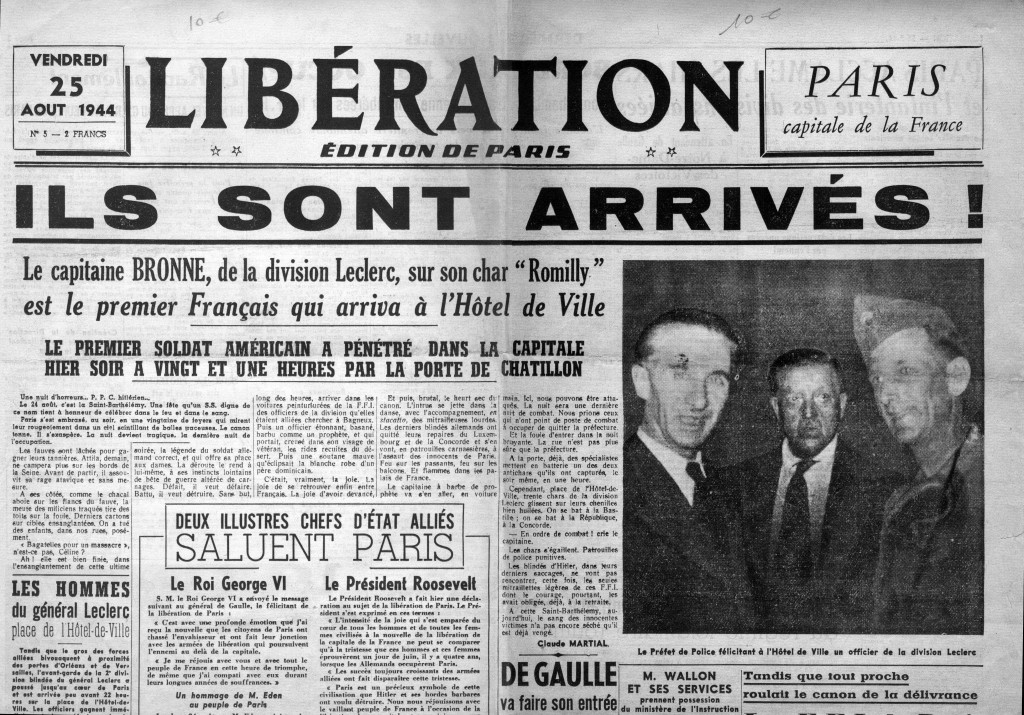 More bizarrely, the writers have played fast and loose with bits of the history of the Liberation of Paris that most French people, and certainly most Parisians are likely to know. For example, at 21:22 on the evening of 24 August, a Free French armoured column led by Captain Dronne, composed largely of Spanish Civil War veterans who had joined the Free French to fight fascism, arrived at the Hotel de Ville in the centre of Paris. Minutes later the great bell of Notre Dame, which had been silent since 1940, rang out in celebration. Soon all the bells of Paris were ringing. For reasons that remain obscure, in the script these two key events are transferred to 03:10 in the morning of the 25th, and late morning, respectively. Why not keep the facts as they were, rather than invent new ones?
More bizarrely, the writers have played fast and loose with bits of the history of the Liberation of Paris that most French people, and certainly most Parisians are likely to know. For example, at 21:22 on the evening of 24 August, a Free French armoured column led by Captain Dronne, composed largely of Spanish Civil War veterans who had joined the Free French to fight fascism, arrived at the Hotel de Ville in the centre of Paris. Minutes later the great bell of Notre Dame, which had been silent since 1940, rang out in celebration. Soon all the bells of Paris were ringing. For reasons that remain obscure, in the script these two key events are transferred to 03:10 in the morning of the 25th, and late morning, respectively. Why not keep the facts as they were, rather than invent new ones?
There are obvious parallels between this film and Is Paris Burning? (René Clément, 1966), based on the international best-seller by Larry Collins and Dominique Lapierre, which in turn relied heavily on von Choltitz’s self-serving memoirs. Both present von Choltitz in a favourable light, although his character is more nuanced in Diplomatie. I think that the earlier film better caught the age, physique and personalities of both von Choltitz and Nordling. Orson Welles played Nordling with his customary intelligence, while Gert Froebe not only looked more like von Choltitz, he also captured the German general’s character, which was summed up by one of his Allied interrogators a few days after Paris was liberated: “a cinema-type German officer, fat, coarse, bemonocled and inflated with a tremendous sense of his own importance.”[1] Arestrup’s complex portayal does not concur with this harsh judgement, which was shared by many of von Choltitz’s comrades.
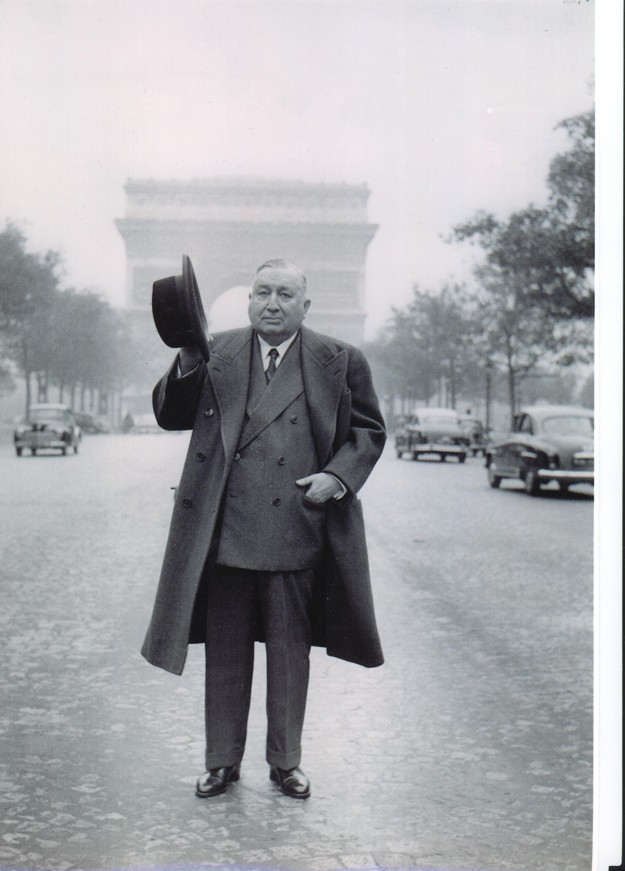
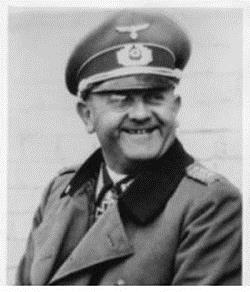 The passion with which Dussolier expresses Nordling’s supposed feelings about Paris reveals that the film is clearly a love-letter to the French capital by the director Volker Schlöndorff. This gives rise to one moment that made me queasy. To convince von Choltitz not to destroy Paris, Nordling urges him to think of the future, and the way that the German people will be perceived after the war is over. If Paris is destroyed, argues Nordling, then the Germans will be marked with the swastika for years to come. Given an earlier allusion to von Choltitz’s role in the extermination of the Jews in Ukraine, I found this argument slightly tasteless. I find it hard to even contemplate a comparison of 6 million dead and the destruction of the ville lumière. Perhaps this is deliberate, an attempt to show us the lengths to which the fictional Nordling is prepared to go in order to flatter and cajole von Choltitz, and to highlight the German’s limited realisation of the true horrors of the Nazi regime, which he had supported for so long. However, there is little in the script to support such a charitable interpretation.
The passion with which Dussolier expresses Nordling’s supposed feelings about Paris reveals that the film is clearly a love-letter to the French capital by the director Volker Schlöndorff. This gives rise to one moment that made me queasy. To convince von Choltitz not to destroy Paris, Nordling urges him to think of the future, and the way that the German people will be perceived after the war is over. If Paris is destroyed, argues Nordling, then the Germans will be marked with the swastika for years to come. Given an earlier allusion to von Choltitz’s role in the extermination of the Jews in Ukraine, I found this argument slightly tasteless. I find it hard to even contemplate a comparison of 6 million dead and the destruction of the ville lumière. Perhaps this is deliberate, an attempt to show us the lengths to which the fictional Nordling is prepared to go in order to flatter and cajole von Choltitz, and to highlight the German’s limited realisation of the true horrors of the Nazi regime, which he had supported for so long. However, there is little in the script to support such a charitable interpretation.
A useful exercise might be to compare Is Paris Burning? and Diplomatie, preferably with a reliable historical text as background reading (my Eleven Days in August is available in paperback). My own preference would be for the sweep of Is Paris Burning? complete with Maurice Jarre’s soundtrack. Overblown and sentimental it might be in parts, but as an account of what happened, it is far closer to reality than the contrived huis clos of Diplomatie.
It’s not clear why so many people are prepared to embrace the myth perpetuated by both films that von Choltitz saved Paris – the idea has proved quite resistant to repeated corrections in books and magazine articles. Perhaps there are good reasons for this – a rejection of the idea that the Germans were collectively responsible for the horrors of Nazism, and the suggestion that there were “good Germans” amongst the fascists, It just seems unlikely that von Choltitz was one of them. True, he was not a member of the Nazi party, but he did admit to his anti-Semitic role in Ukraine, and he was most definitely not the saviour of Paris.
On one point, however, Diplomatie is absolutely spot on. It captures the confusion in France (and elsewhere) about how to pronounce the name of the German commander of Paris. In the film, the Germans correctly pronounced it with a hard K sound; Nordling follows post-war French fashion and uses the soft ‘Ch’ version. The contrast between the two sounds, which can sometimes be heard in successive lines in the dialogue, embodies the complexity of combining history and drama.
Volker Schlöndorff, Director, Diplomatie [Diplomacy], 2014, Colour, 84 min. France, Germany, Film Oblige. Gaumont, Blueprint Film.
- UK National Archives NA GRGG 181 (C).